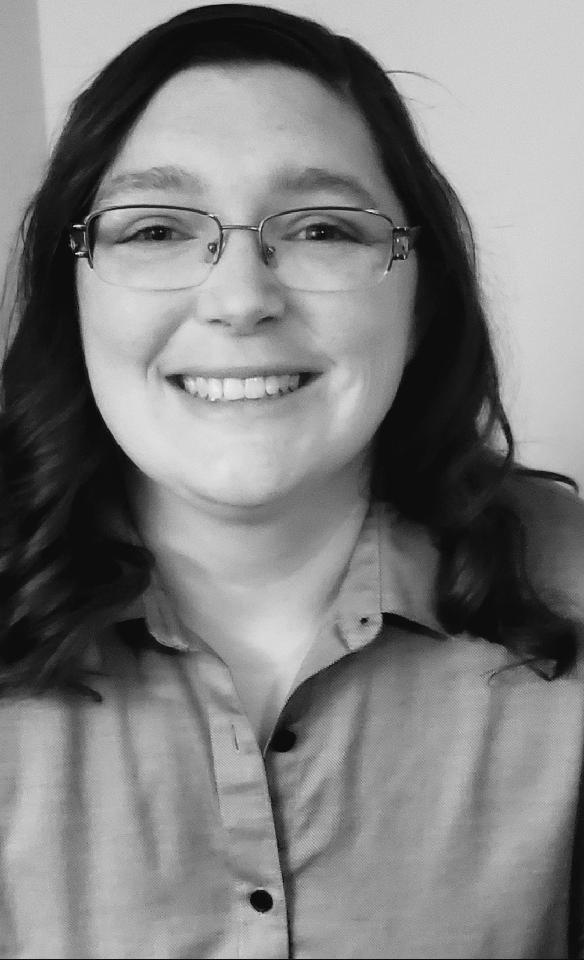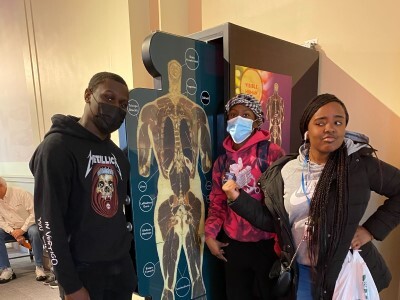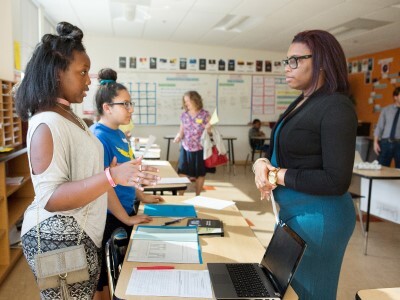Reimagining Assessment
Performance-Based Assessment: Exploring Myths and Falsehoods in Education
Topics

Educators are rethinking the purposes, forms, and nature of assessment. Beyond testing mastery of traditional content knowledge—an essential task, but not nearly sufficient—educators are designing assessment for learning as an integral part of the learning process.
Debunking misconceptions and assumptions around performance assessments.
Myth 1: Performance-based assessment and project-based learning are different.
Honestly, it depends on how you use them.
A high quality project-based learning experience allows learners to engage with the world and to share and understand their values. It will be culturally responsive, flexible in process and product, engaging, and adhere to the elements of Universal Design for Learning. A high quality performance-based assessment has all those things too, but they might be used differently. Are you letting the evidence from a project-based learning experience stand on its own, or are you requiring students to also take a traditional assessment to prove their knowledge? If you’re still giving that paper and pencil test, you’re not harnessing the power of performance assessment.
Let’s take a simple example from a science class many of us experienced in school. The teacher wants students to apply basic electricity knowledge to create a closed circuit. The project-based learning experience asks them to design and create a punny greeting card that lights up or plays music. Students then present their cards to a classmate. Throughout the learning process, the teacher is observing, asking questions, and taking notes of what students know and can do. At the end of the experience, the teacher holds a reflection circle where students share a key learning about electricity.
In a performance-based assessment system, the cards, observation notes, and reflection at the end are enough evidence for the teacher to understand what a student knows and can do. In project-based learning, students might engage in real-world learning and systems might still require a traditional assessment as the evidence of learning. So it really comes down to philosophy and how you're using project-based learning in your system. Are projects interconnected to help build a body of evidence that demonstrates what students know and are able to do, or is the evidence of learning not validated unless students can also pass a traditional paper and pencil test?
Performance-Based Assessment Systems challenge the real purpose of assessment and why we are doing it. For years, I’ve heard teachers say, “We give tests to prepare them to take tests in the future.” This argument for traditional testing has always baffled me; there is a more meaningful way.
I’m also inclined to name here that “traditional” is used to describe the last one hundred or so years of assessment, as multiple choice is relatively new on the world stage. Traditional assessments in the history of mankind have always been performance based.
A strategically designed performance-based assessment system can hold school systems accountable for student performance as well as eliminate this extra time spent on joyless tests that don’t assess the most important skills our kids need and communities want: communication, collaboration, moral literacy, media literacy, creativity, critical thinking, and self-direction. Project-based learning is the way to go; just make sure you are also capturing student learning in meaningful and manageable ways to communicate student growth and to reflect on practice.
A performance-based assessment system can tell us a lot more about what students know and can do than traditional assessment systems.
Myth 2: Performance assessments can only be given on a large-scale.
Honestly, this is a myth.
Many folks think that performance tasks can only be year-long or semester-long work. But, in fact, educators can use performance tasks in a variety of ways, both big and small, in the middle of a unit or at the end, to see how students are communicating their new understanding or how they are approaching new problems.
Using a simple example, if I am teaching a fractions unit, at the middle of the unit after we’ve already done addition of positive fractions, I probably want to check to make sure that learners can apply that skill or do some strategic thinking around how to solve questions that require that skill before moving onto subtracting fractions. So, I might give a small, performance-based task that allows me to see where students are right now in that discrete skill and also assess how they are communicating as a mathematician. I can see how students are thinking about problem solving. Are they using mental math? Are they drawing factor trees? Who is struggling? Who isn’t? Why? Smaller performance tasks can provide real-time feedback and actionable data to support teaching practice and student learning.
Of course, some tasks are really big. I might have a year-long task in which students are engaged and getting feedback along the way. Capstones, gateways, or learner-designed assessments are really big. But, it's not about big or small; it’s really about how evidence of learning from the tasks is used on the learning journey.
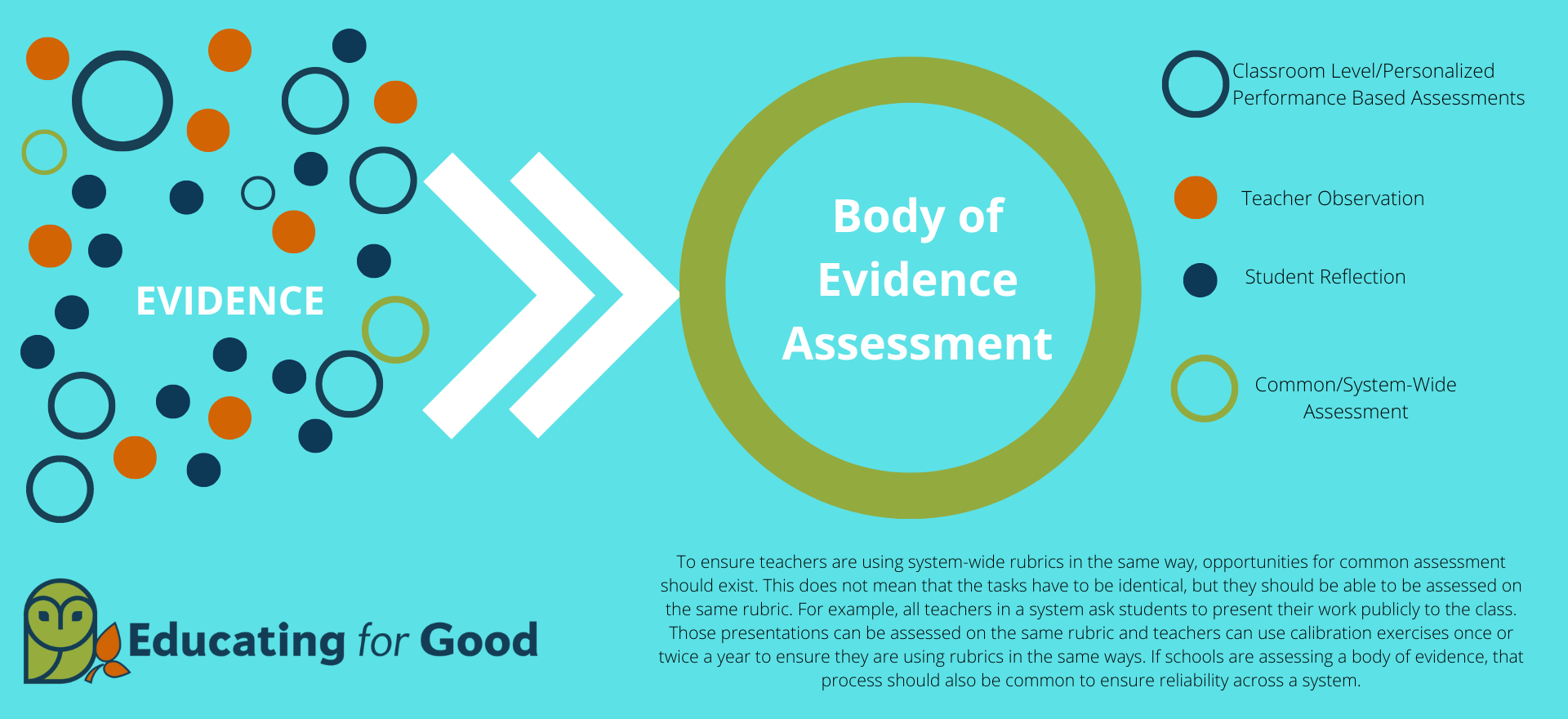
Body of Evidence
Myth 3: Performance assessments are too subjective for reliable scoring.
Honestly, this is a myth.
This one is interesting, because it comes with the assumption that standardized tests are 100 percent reliable, which they are not. Honestly, educational assessment is a human act. Humans make it and humans take it. Just because a multiple-choice test can be assessed with accuracy—did the test taker choose the right answer—doesn’t mean those answers tell us anything about a test taker or what they know. Our culture tends to look at the results from these tests as absolutes, but honestly, they are based on theory.
A performance-based assessment system can tell us a lot more about what students know and can do than traditional assessment systems, and with reliability. Through conversations and calibration exercises, teachers in a system can develop a deep understanding of the language of the rubric in relation to the student work produced. The more teachers assess, and assess together, the more reliable the assessment process becomes because teachers are using the same rubric in the same ways.
We can look to the process of AP assessors, who annually meet en masse to calibrate and assess essays, essentially small performance tasks. School systems can set up similar systems, not for every task or every rubric, but for most, and certainly for an annual portfolio review. It is possible, if we commit to it, as much as we’ve committed to making, taking, and scoring “traditional” paper and pencil tests.
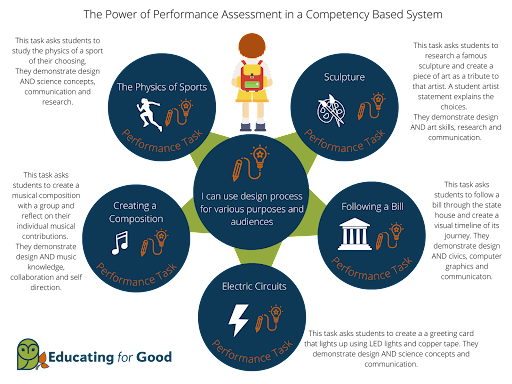
There is great power in a performance assessment system, if it’s harnessed. Think carefully about the evidence you collect from project-based learning experiences and if you really need to give that paper and pencil test. Student reflection, teacher observation, and the products students create are most often sufficient. Don’t get overwhelmed by large unwieldy performance tasks that do too much. Sometimes a series of smaller tasks to assess individual student performance is more meaningful and manageable than a semester-long task—that goes for teachers and students. Finally, stay realistic about assessment. It’s human work, and let’s make sure it’s humane work.
This post originally appeared on the Center for Collaborative Education blog.

